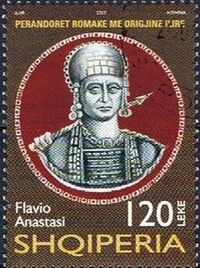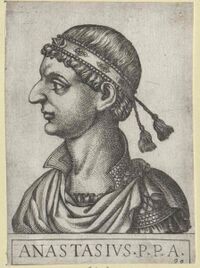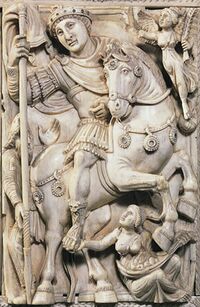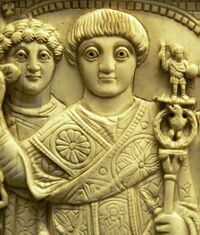Anastasius I

Anastasius I (c. 431 – 9 July 518) is one of the few Roman Emperors you can lick in a public place. He is considered to be one of Albania's greatest people by dint of being born in Durazzo and was given his own stamp in commemoration. He actually appeared in a set of stamps issued in Albania that also claimed other Roman emperors from in and around that time period, including Claudius II, Diocletian, and Constantine the Great. Perhaps you have heard of Constantine, the others maybe not so, and Anastasius not at all. Yet remarkably, this non-soldier-boy emperor successfully ruled in Constantinople from 491 to 518 and managed to die peacefully in his pajamas.
Early years[edit]
Anastasius was born in about 431. He had family connections back to Emperor Constantius I (Constantine the Great's dad). Like David Bowie, Anastasius he had two eyes of different colours. This gave him the additional name of 'Dicorus' or Black and Blue. Whether Anastasius could sing or compose songs like Bowie isn't recorded (shame!) but he may have had a good set of lungs. One of his earliest interests was to join the church and become a bishop, which would have involved a lot of singing. Anastasius retained a keen interest in amateur theology, he was fully conversant in the arguments aired at various church councils, and he knew the difference between Trinity, Bigamy and Adultery.
At some stage, Anastasius made his way to Constantinople, where he got a job in the imperial bureaucracy. There Anastasius buried himself deep in papyrus, parchment and a lot of squid ink to create unnecessary paperwork. He seems to have been good at it and steadily rose to the top civil servant role. Anastasius never married and was accused of being a eunuch, though he readily refuted it by pulling aside his tunic and dropping his pants.
Emperor[edit]

In 488, with his knees going, Anastasius applied for the job of Bishop of Antioch. This seemed a natural retirement home for a dedicated if dull civil servant, but at the last minute, he was beaten to the post by a wealthier set of money bags. Disappointed, Anastasius marked off the days of his official pension and planned to write a book about Jesus. His research connected him to the super pious Empress Ariadne, wife of Emperor Zeno. She was plump but had an imperial bearing — she was, after all, the daughter of Emperor Leo I. The couple struck up a friendship, but Ariadne was considering her future. Her husband was planning to hand over the throne to his brother Longinus, which would have consigned her to exile to a nunnery. Ariadne may have been religious, but she liked sleeping in comfy beds, rather than in a cot at a self-flagellating House of God.
In April 491, Emperor Zeno died. Empress Ariadne summoned all the resident Roman senators to the imperial palace to announce the succession. The senators expected to hear Longinus was the next Purple One, but Ariadne surprised them all by naming Anastasius instead. Longinus himself was out of the capital — 'banished by Zeno', as Ariadne put it. The senators bought into Ariadne's story and Anastasius was proclaimed emperor.
Marriage and rebellion[edit]
A respectful month after he became emperor, Anastasius married the Official Widow Ariadne. In her youth, she had produced a son, the short-lived emperor Leo II, but there had been no more children with her late husband, nor would there be with Anastasius, she was after all pushing 40.
Longinus, meantime, was stirring up a stink as regards being passed over for Emperor. His fellow Isaurians again rebelled against the authority of the Eastern Roman Empire. Anastasius — for the first time in his life — buckled on armour and surprised no one more than himself by defeating the forces of Longinus. Longinus was captured and banished to a monastery to contemplate the folly of life or something. Whatever he concluded, history does not record it. However, the other Isaurians continued being revolting in their home territories for seven years.
Whilst this was going on, Anastasius received news from Italy that the Ostrogoth Theodoric the Great had killed his rival Odoacer at a raucous dinner party in Ravenna. Odoacer was, after all, the barbarian who had pulled the life support cable from the Western Roman Empire in 476. So his death was no loss to the Eastern Roman Empire. However, Theodoric likewise believed that Italy and a large chunk of the Balkans should once again fall within the Roman or Byzantine orbit.[1]
The nature of Jesus[edit]
With the frontiers reasonably settled and no interest in starting wars elsewhere, Anastasius returned to his first love — theology. The Christian world had long been prone to schisms, heresy hunts and personal attacks as regards hygiene ever since it displaced paganism. The fifth century had already seen the emergence of the Nestorian and Monophysite Christian sects[2] over the issue of whether Jesus was able to compartmentalise his 'divine' and 'human' natures whilst walking around Judea, or had only one nature that showed aspects of both 'God' and 'Man'. In the middle were the Catholics and Orthodox, who maintained they were the true understanders of what this business was all about. Others just preferred to lie down in a darkened room.
Anastasius was more of a 'moderate' Monophysite in his personal beliefs and tried to influence the debate by nominating his mates for various posts. The Papacy in Rome, who had previously ostracised Emperor Zeno for his unorthodox views, decided Anastasius was no better and cut him out of their Easter-card mailing list. There followed the usual 'You're Going to hell' from both sides of holy men. Empress Ariadne eventually persuaded Anastasius to leave off theology and take up singing again. The schism between Constantinople and Rome remained unhealed, but no one was burning the other, so that was progress of a kind.
Revolt at home[edit]
For over 20 years, Anastasius had been unchallenged in his position. The Persians had gone to war after the River Tigrish flooded and washed away all the boundary markers. The war had dragged on for four years until Anastasius brown-enveloped a heavy bribe to the Persian Shah Kavad to piss off and go back to his capital at Ctesiphon. The war provided no great heroic battles, but did burnish the military credentials of one distinguished Roman aristocrat called Areobindus — the last Areobinder. He also happened to have a reasonable claim to become the next emperor via his marriage to party hostess Anicia Juliana, who was the daughter of Western Roman Emperor Olybrius and granddaughter of that great cowardly failure Valentinian III.
In 512 there was a rebellion in Constantinople by supporters of the Blues against the Greens after a particular dirty chariot race in the Hippodrome. Since the Blues were supporters of the Chalcedonian,[3] and the Greens favoured the Monophysites, the inter-mob violence turned theo-political with knives and truncheons. The Blues demanded the 'old man' step down (Anastasius was now over 80) and someone younger take over. They proclaimed Areobindus (a slightly less youthful 72) as emperor and went off to find him. Areobindus had no interest in this job and hid in a closet whilst the Blues searched for him. By then (and without a leader), the rebellion burnt out. Other emperors would have had Areobindus strung up just for inadvertently lending his name to a revolt, but Anastasius let the matter rest. Areobindus came back out of the closet and his wife Anicia carried on holding her exclusive soirées.
Death[edit]
The old emperor kept everyone guessing who he was going to appoint as his successor. Empress Ariadne had no say, by virtue of dying in 516, but that still left a large field of eligible candidates. These included Anastasius's younger brother Paulus (also well into his 80s) and the extensive family linked to Anicia. In the end, when Anastasius died[4] in September 518, the various contenders for the throne had to go to a job interview. The winner was Justin, a barely-literate soldier who commanded the emperor's personal guard. Justin was hardly a new start: He was nearly 70 himself. One old wrinkly had been replaced with another.
References[edit]
| Preceded by: Zeno |
Byzantine Emperor 491–518 |
Succeeded by: Justin I |



